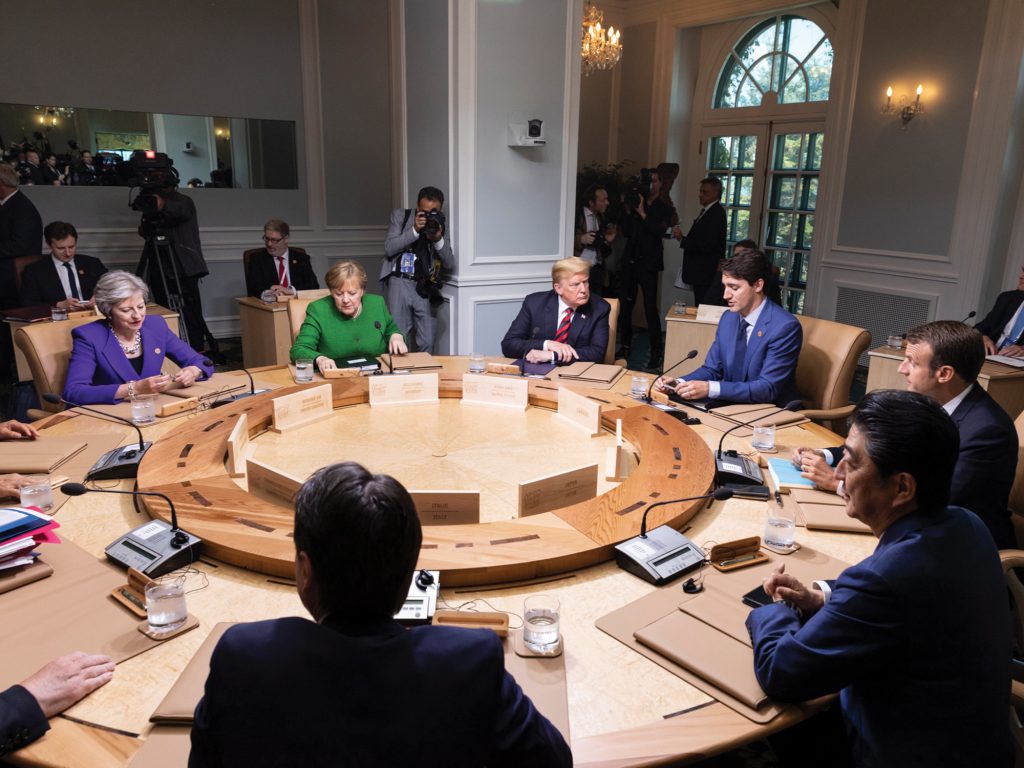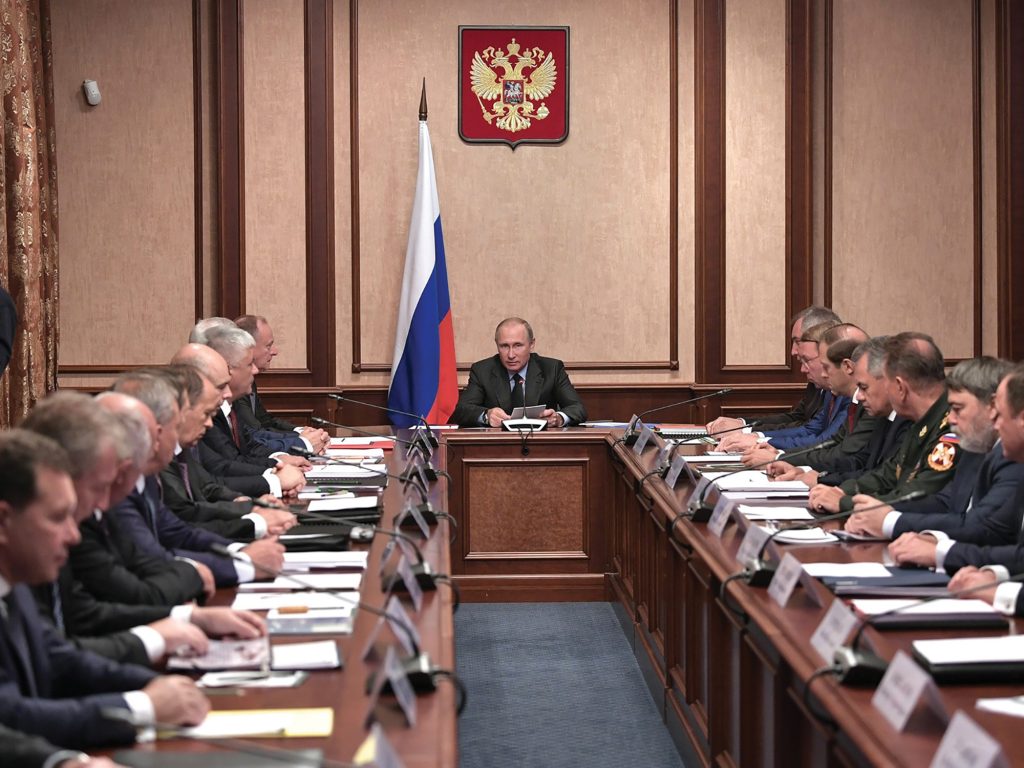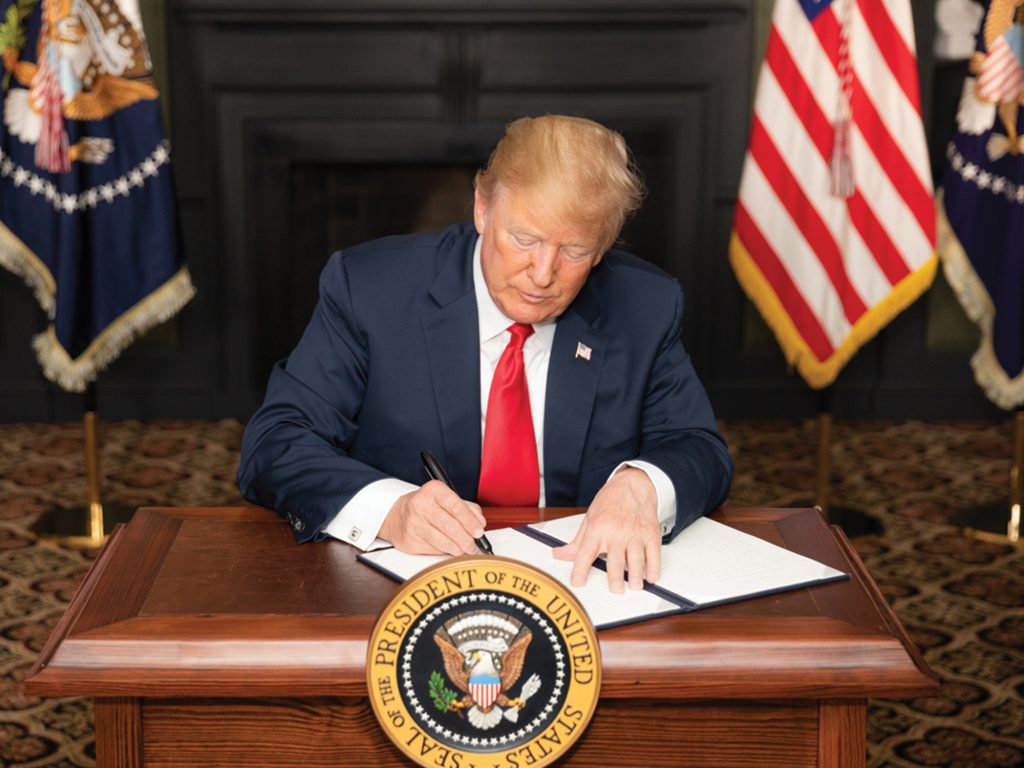In recent years, US economic and financial sanctions have become favored tools of US power, having been deployed to address threats as disparate as human-rights abuses, Iranian nuclear proliferation, Russian aggression, transnational criminal activity, and the deteriorating situation in Venezuela. The Barack Obama administration, and the George W. Bush administration before it, used sanctions to address myriad national security and foreign policy challenges. The Donald Trump administration has followed suit, expanding the use of sanctions even further.
Many rightly see the use of sanctions as a middle ground between words and war. They carry significantly more weight than oft-nuanced diplomatic statements (or even harshly worded tongue lashings), but do not require the dramatic escalation, risk to lives, and financial costs of a military option. The centrality of the US financial system and the ubiquity of the US dollar in the global financial marketplace make sanctions a powerful tool to have on hand when confronting foreign policy challenges. Moreover, the US government has gotten better at using these tools over time, evolving from the blunt instrument of an embargo to more nuanced restrictions on all or select business with unique bad actors around the world.

There are great risks, however, as having such a powerful hammer means all of the world’s challenges can appear as nails. The Trump administration’s unique approach to sanctions has laid bare those risks. The danger, however, is not the overuse of sanctions. The United States has demonstrated that sanctions can be calibrated and used carefully, even if more frequently. The greater danger is that sanctions may become a substitute for actual policy, rather than merely a tool of foreign policy. The use of unilateral sanctions without a broader diplomatic strategy, international credibility, or a pragmatic endgame risks significant harm to their effectiveness, and to the United States’ future ability to deploy them.
What are they and why are they used?
In the realm of foreign policy, the term “sanctions” refers to economic and financial sanctions administered primarily by the Office of Foreign Assets Control (OFAC), a specialized unit housed within the US Department of the Treasury; the State Department also has the responsibility for imposing sanctions under a handful of programs, including those relating to counterterrorism and Iran. In certain circumstances, OFAC-administered sanctions are complemented by export controls implemented by the US Commerce Department.
In practice, sanctions are prohibitions on certain types of activity or behavior, generally by US individuals and entities (collectively, “persons”). They range from blocking sanctions—which block, or freeze, all the designation target’s assets in the United States, and prohibit all transactions with the target—to more limited “sectoral sanctions” used against Russia and Venezuela, which limit access to financing or certain services, among other options.
The ideal use of sanctions is to coerce the target—an individual, entity, or jurisdiction—to change behavior. The economic and financial pain incurred by the target ideally provides great leverage to negotiate an end to behavior that is a threat to the United States. For example, sanctions on Iran provided leverage that the United States and its negotiating partners used to obtain Tehran’s nuclear concessions in the Joint Comprehensive Plan of Action (JCPOA).
They can also be used as a deterrent. Sanctions that target malicious cyber activities—or, more recently, electoral interference—provide a significant deterrent to many who would consider participating in such activities to harm the United States or its citizens. Sanctions have far-reaching impacts, and those significant penalties can deter some who might otherwise consider engaging in sanctionable behavior.
Unfortunately, behavior change and deterrence are not always achievable goals. For example, sanctions will not change the behavior of terrorist organizations such as the Islamic State of Iraq and al-Sham (ISIS). Instead, sanctions can be used to isolate or name and shame their targets. This does not necessarily reduce sanctions to an angrily worded press release from the Treasury Department. Most large, reputable banks around the world screen against US sanctions lists, and generally do not do business with or maintain accounts for designated persons—banks typically won’t deal with designated associates of ISIS—making their nefarious activities more difficult and expensive. Furthermore, publicly naming a target and describing its bad activities provides leads to foreign intelligence, law enforcement, and militaries, which may choose to take independent action against the target.
Trump administration’s use of sanctions
The Trump administration has turned to sanctions frequently, and has often touted that it has produced more sanctions actions than the Obama administration. Sanctions are a key component of the Trump administration’s response to national security and foreign policy challenges.
- Sanctions are at the forefront of the administration’s policy on Iran and North Korea, with a goal of imposing maximum pressure to achieve negotiated settlements on each country’s provocations.
- Russia’s aggressions have expanded since its 2014 invasion of Ukraine, and the Trump administration has used multiple sanctions programs to counter the Kremlin.
- The administration has increasingly turned to sanctions as a response to the crisis in Venezuela, expanding the scope of the previous administration’s response by imposing broader measures targeting the Nicolás Maduro regime’s financial levers of power.
- Military actions in Syria against terrorist targets, and in support of rebel groups, have been complemented by sanctions targeting the Bashar al-Assad regime’s procurement networks and personal finances—similar to the actions taken under the Obama administration.
- Human-rights abuses and corruption have been the focus of actions taken under the Global Magnitsky sanctions program.
- Counternarcotics and counterterrorism sanctions have proceeded at a similar pace to that of the previous administration. A notable achievement in the counterterrorism realm has been the establishment, along with several regional partners, of the Terrorist Financing Targeting Center in Riyadh, to coordinate joint sanctions against terrorist targets.
Sanctions are a key component of the Trump administration’s response to national security and foreign policy challenges.
There are a few reasons why the Trump administration has used sanctions even more frequently than previous administrations. Sanctions are primarily an executive-branch tool—Congress granted broad authority to the president in 1977 under the International Emergency Economic Powers Act (IEEPA)—which makes them attractive to an administration that has struggled at times to work with Congress on foreign policy issues. The main sanctions apparatus is fully staffed and highly competent; OFAC is an entirely civil-service agency (meaning there was no significant turnover during the presidential transition) and, in contrast to many other agencies, has seen its budget rise under Trump.
US sanctions on Russia have been undermined by the absence of a coherent strategy and consistent message from the White House.
At the same time, the administration has often deployed sanctions as the only tool in a foreign policy strategy, and often in the face of overwhelming international opposition. Sanctions have sometimes been used by default, and in place of a broader foreign policy strategy. The lack of consistent and implementable policy goals, as well as patient follow-through, has undermined the efficacy of sanctions under Trump, even in areas where the administration has implemented tough measures. The ineffective use of sanctions creates threats to the utility of the tools themselves—more so than any overuse.
The administration deserved plaudits for successfully corralling the world, especially the United Nations Security Council, to impose tough sanctions on North Korea in advance of President Trump’s meeting with Kim Jong-Un. The maximum-pressure campaign convinced even China to take its UN sanctions obligations more seriously, and to cut off bilateral trade that was critical to North Korea. However, once the president announced the summit with Kim, China quickly eased its push for compliance. Subsequently, the summit lacked measurable deliverables or new commitments from North Korea, and Trump’s effusive praise for Kim—and his post-summit tweets maintaining that the North Korean threat was over—gave China, and others, an excuse to further ease the pressure. It is likely that a second summit between the two leaders—currently being negotiated—will take place, with the United States possessing less leverage than it had during the first.
Trump’s Iran strategy similarly relies on a maximum-pressure campaign to try to convince Tehran to renegotiate the JCPOA, to address other areas of Iranian bad behavior beyond the nuclear program. However, Trump is undertaking this campaign in the face of staunch opposition from almost all other governments—notably including all other parties to the JCPOA. Withdrawing from the JCPOA itself—in the face of significant anger from US allies (especially France, Germany, and the UK)—makes it extremely difficult for this administration to achieve pressure greater than that which existed in 2012 and led to the JCPOA.
Trump and his team are trying to replicate that pressure through unilateral escalation of sanctions, without the broad international consensus on the threat of Iran’s nuclear program—reflected in several UN Security Council resolutions—that drove broad international sanctions in the run-up to the nuclear deal. Indeed, the European Union (EU) has amended its blocking statute to prohibit European companies from complying with US sanctions, and announced its intent to create a special payment vehicle to avoid their impact. While these measures may not be effective, as a practical matter, at insulating European companies from US sanctions, they reflect a striking effort by the EU to seek to actively undermine US sanctions, and by extension, US policy. Iran may face economic hardship as a result of the reimposition of the sanctions, but it will not face the same level of diplomatic isolation this time around. Reduced leverage against Iran will hamper the ability of the United States in any renegotiation to get a deal stronger than that which it exited earlier this year.
Similarly, US sanctions on Russia have been undermined by the absence of a coherent strategy and consistent message from the White House. As the authors have written before, the president has consistently undermined his administration’s actions on Russia by being publicly subservient to Vladimir Putin, and by siding with Putin’s perfunctory denials over the consistent judgment of his intelligence and foreign policy communities.1Brian O’Toole and David Mortlock, “Trump’s Election Meddling Sanctions Will Not Deter Russia,” New Atlanticist (blog), Atlantic Council, September 12, 2018, http://www.atlanticcouncil.org/blogs/new-atlanticist/trump-s-election-meddling-sanctions-will-not-deter-russia. Sanctions on Russia are generally designed to serve as a deterrent against further aggression, but even the tough actions this administration has taken do not provide sufficient deterrence, because of a president who has been out of step with his own administration’s policy.

In addition, the surprisingly limited number of public enforcement actions by OFAC in 2018—just three at the time of publication—have left many practitioners wondering whether US sanctions will maintain their bite. OFAC’s enforcement of sanctions drives compliance, both in the United States and internationally, as has been seen in the aftermath of several large cases since 2012.
Nonetheless, anecdotal evidence suggests that most major international companies remain committed to complying with the technical prohibitions of US law. Going forward, the impact of US sanctions seems to be at greatest risk in the utility of secondary sanctions and the credibility of the threat of sanctions against companies engaged in activities contrary to US foreign policy. The difficulties of bringing other governments onboard the US agenda raises questions of whether refineries will halt importing Iranian oil, whether Chinese companies will stop selling to North Korea, or whether militaries will stop buying arms from Russia. If they do not, the United States will find itself forced to decide whether to cut off major commercial actors from the US economy, at significant cost to its own interests, or to render the US measures feckless
The Trump administration is not alone in struggling to make sanctions effective. The Obama administration, for example, occasionally used sanctions to address crises in Africa, but achieved limited results beyond the press releases. The US government must, as a matter of routine, consider whether sanctions will be effective before reflexively turning to them. There are several conditions under which sanctions are most effective.
When are sanctions most effective?
Part of a Coherent Strategy. Sanctions must be used as only a part of, and not a substitute for, achievable policy objectives. Concerns about the administration’s Iran and Russia strategies are discussed at length above. In addition, it is abundantly clear that the Maduro regime is responsible for the widespread corruption, rapidly deteriorating economic conditions, human-rights abuses, and political repression in Venezuela. The Trump administration, however, has little publicly stated policy on Venezuela, beyond sanctioning the Maduro regime for its corruption and repression. This is not unique to Trump—US policy toward Venezuela has been a conundrum since the early 2000s—but the administration needs to be careful with the sanctions it deploys against the regime. There is potential for spillover to the US economy, and increased hardship for the Venezuelan people, if sanctions are used ham-handedly, without a strategic foreign policy.
Multilateral is Best. By themselves, US sanctions are disproportionately powerful, due to the centrality of the US economy and dollar in global markets, but sanctions are always most effective when the United States can rally allies and partners to its cause. A multilateral approach not only increases the practical impact of the sanctions, but also demonstrates international resolve in defense of US norms. This is a relatively straightforward concept, but is often difficult to execute in practice. Pursuing a multilateral course requires a deft diplomatic touch and a willingness to compromise. China does not want a nuclear North Korea, but also does not want to destabilize the regime in Pyongyang. Therefore, getting China on board with UN sanctions requires an astute understanding of Beijing’s redlines and goals. Even less-than-perfect sanctions implementation from China makes sanctions much more powerful, given China’s historic role as North Korea’s key partner and its outlet to the rest of the world.
Where Tools are Effective and Justified. Sanctions should not be used merely as words harsher than a diplomatic rebuke, or in cases where national security is only tangentially at risk. They should instead be used where they can actually have an effect, and when the harm they cause is justified. That is not to say that sanctions with little immediate economic impact are always unjustified. But, sanctions against actors with no ties to the United States should be coupled with a broader strategy of deterrence and isolation, and with other tools brought to bear. For example, the use of sanctions against Turkish officials in response to Turkey’s detention of an American pastor did not appear to implicate national security interests or reflect a broader deterrence strategy, but seemed designed to appeal to a domestic political audience, which may undermine their legitimacy and efficacy when deployed in other contexts.

Calibrated to Protect Other US Interests. Sanctions are not always precise, and can often interfere with other US interests, including humanitarian support, legitimate access to financial channels, and the stability of supply chains. OFAC has broad authority to make exceptions to the sanctions, using licensing. It has made frequent use of the tool in recent years, including allowing dealing in certain Venezuelan bonds and allowing the wind-down of operations with the companies of designated Russian oligarchs, because these issues aligned with broad US interests. OFAC must also be given the resources to respond nimbly to specific license requests, when they are in the interest of US policy.
Can be Lifted. Sanctions are most effective when they can be lifted upon realization of a policy objective. The authors have written before that Congress must be ready and willing to lift sanctions on Russia under the Countering America’s Adversaries Through Sanctions Act of 2017, if the Russians truly live up to their commitments.2Daniel Fried and Brian O’Toole, The New Russia Sanctions Law (Washington, DC: Atlantic Council, 2017), http://www.atlanticcouncil.org/publications/issue-briefs/the-new-russia-sanctions-law. Refusal to lift sanctions when they have achieved their declared objective would undermine both the sanctions tool and the interests the United States is trying to protect; why would Russia live up to its commitments in Ukraine if Congress will never lift sanctions? This issue is also at the forefront of European anger at the United States over its withdrawal from the JCPOA. Iran has continued to comply with its JCPOA obligations and, as a result, reimposed US sanctions face questions of legitimacy across US allies, which undermines both their immediate impact and their utility in bringing Iran back to the negotiating table.
Effectively Messaged. The policy objectives of each sanctions regime must also be effectively and publicly messaged. Sanctions work best when they come with clear, identifiable, and achievable goals. This tells the target what behavior change is necessary to achieve a lifting of sanctions. Second, that public messaging is critical to any deterrence. A competent strategy on Russia means little if it cannot be publicly and consistently articulated. Tough talk in private diplomatic engagements and threats of future sanctions mean little if Putin believes that President Trump will soften any impact because his public tweets profess a desire to be friends with Russia.
Recommendations
Used correctly, sanctions can, and should, remain a key tool in the national security toolkit. To that end, this paper submits several recommendations.
First, invest in the tool. The use of sanctions began to expand significantly in 2008, but for many years, neither the executive nor legislative branch made a corresponding investment in the required personnel or technological infrastructure. In 2018, the Trump administration took a necessary, and long-overdue, step by increasing the budget for OFAC’s parent organization at Treasury. However, that investment was offset, to some degree, by ongoing delays in the filling of positions at the State Department, and the elimination of the office of the sanctions coordinator. OFAC’s budget should continue to increase, particularly for information technology and capable staff, and there should be a renewed push to fill the State Department’s related offices and roles.
Fully evaluate sanctions before imposing them. The whole point of sanctions is to harm the target more than oneself or one’s friends. Rushing to impose sanctions without understanding the impact and potential blowback has huge risks. Iran hawks are pushing for action against the Society for Worldwide Interbank Financial Telecommunication (SWIFT) if it does not summarily fall in line with US secondary sanctions. The impact of a SWIFT cutoff for Iran is likely to be relatively limited.3Samantha Sultoon, “SWIFT Action Risks Unintended Consequences,” New Atlanticist (blog), Atlantic Council, October 9, 2018, http://www.atlanticcouncil.org/blogs/new-atlanticist/swift-action-risks-unintended-consequences. However, the spillover could be significant, as SWIFT arguably helps ensure the centrality of the US financial system in international transactions, promotes transparency in international payments, and is a critical counterterrorism partner for the United States. Sanctioning SWIFT could harm the United States more than a SWIFT cutoff would harm Iran.
Use sanctions to achieve a clear policy goal. Not every international challenge is a nail appropriate for the sanctions hammer. Obama-era Treasury Secretary Jacob Lew cautioned against sanctions overuse in a 2016 speech, which was the first public attempt by a senior official to establish a sanctions doctrine.4Jacob J. Lew, “Remarks of Secretary Lew on the Evolution of Sanctions and Lessons for the Future at the Carnegie Endowment for International Peace,” US Department of the Treasury, March 30, 2016, https://www.treasury.gov/press-center/press-releases/Pages/jl0398.aspx. The authors can hardly phrase it better than he did: “We should impose sanctions only when we have reasonable confidence that they will achieve their intended policy goal, and only when the balance of costs and benefits is in our favor.” Don’t use sanctions as a substitute for policy; use them only as part of a policy goal, in conjunction with diplomacy or military action to achieve a clear policy objective.
Related, develop new tools as a supplement or alternative to sanctions. There are many situations in which sanctions are not terribly effective against their targets, but are used anyway. Other tools exist to achieve policy goals, but may need to be tweaked to be more effective. For example, beneficial-ownership legislation and financial-transparency regulation would reduce opportunities for hidden and corrupt Russian money to flow into the United States—complementing US sanctions targeting the personal assets of senior Russian officials, and with fewer spillover consequences than the imposition of new sanctions. In cases where naming and shaming bad actors and preventing their travel to the United States is a primary goal, the State Department should be able to publicize visa denials (in most cases today, it cannot) with a statement of the case.
Work with allies and partners. Diplomacy can build broad coalitions to impose sanctions, such as the Obama administration’s coalition with the EU and Group of Seven (G7) on sanctions against Russia, or the Trump administration’s initial push to impose maximum pressure on North Korea. Both were examples of successful cooperation with allies and partners that created conditions for success (even if successful end states remain elusive). Conversely, going alone could degrade the effectiveness of the tool over the long term. With respect to Iran, US allies are seeking to actively undermine the Trump administration’s policy of maximum pressure on Iran, including by developing payment methods that are wholly separate from those of the United States, and which would undermine US sanctions.
Finally, let the technocrats do their jobs. Sanctions are often at their best when the most knowledgeable people—those mid-level technocrats—are given latitude to execute approved policy. This includes the sanctions experts who craft the restrictions and target bad actors. It should also include those who issue the licenses intended to alleviate unintended consequences of sanctions, and those who enforce action against violators. Licenses are critical to effectively managing sanctions, and enforcement both provides additional deterrent and highlights holes in implementation that US persons, especially banks, can close proactively. Senior officials, and Congress, should ensure sufficient technical expertise at OFAC, and across the US government, is dedicated to effectively implementing existing sanctions programs, rather than just creating the next one.

